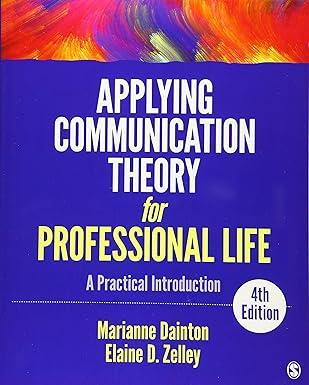On average, how often did you watch educational television (for example, Sesame Street) or use educational media
Question:
On average, how often did you watch educational television (for example, Sesame Street) or use educational media (e.g., computer games, apps) when you were a child? (circle one) Not at All | Very Little | Occasionally | Every Week | Every Day To what extent do you expect college professors to use the following teaching styles (check one for each style)?
To what extent would each style motivate you to want to learn (check one for each style)?
To what extent do you think you actually learn using the following styles (check one for each style)?
We distributed the questionnaire to 75 current college students and 75 adults over the age of 50. We choose age 50 because those individuals would have been in school already when Sesame Street appeared and before the advent of personal computer technology. There were 58 female and 17 male college students. There were 51 female and 14 male adults.
Our results showed that the average report of using educational media was 3.7 out of 5 for the college students, corresponding to frequent use of educational media. The average amount of using educational media was 2.2 for the adults, corresponding to very little use of educational media. Accordingly, the college students consumed more educational media than the adults did as children.
The remaining average answers are calculated in the following chart, with the instructional style listed in the farleft column and the mean expectation, motivation, and learning score for the two groups in the remaining columns.
In looking at the chart, the only significant difference when considering entertainment education is in motivation, with college students reporting being motivated by entertainment education to a larger extent than adults. However, neither group seems to expect a whole lot of entertainment education, and neither group reports learning a lot from entertainment education. Thus, the predictions of EET are not fully supported.
Questions for Consideration
1. Based on what you read in Chapter 1 and the additional information just provided, was EET developed using an inductive or a deductive theory development process? Why?
2. What type of research (primary or secondary) was used in the development of EET? Was this a good choice?
3. Is EET social scientific or humanistic? Provide details from the information in Chapter 1 and this chapter to support your case.
4. Which research method was used to test the theory? Is this the best method? Why, or why not?
5. Discuss what ethical challenges researchers should consider when conducting this type of research. How do ethical challenges shift if the research method changes?
6. In what ways do you think EET should change or grow in the future? Be specific in detailing how it might change and why it should change in that manner.
Step by Step Answer:

Applying Communication Theory For Professional Life A Practical Introduction
ISBN: 9781506315478
4th Edition
Authors: Marianne Dainton, Elaine D. Zelley





